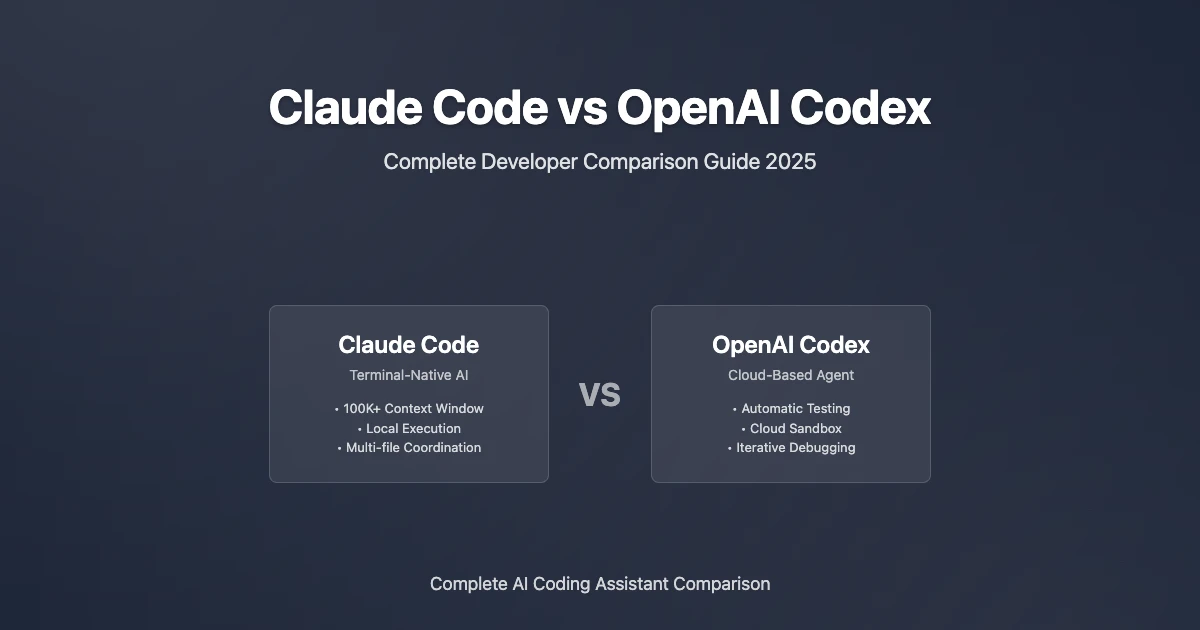The Claude Code vs OpenAI Codex debate represents one of the most important decisions facing developers today. With AI coding assistants now used by over 92% of professional developers according to GitHub's 2025 survey, choosing the right tool significantly impacts productivity and development quality. Industry research by Gartner projects that 75% of enterprise software engineers will use AI code assistants by 2028.
Claude Code is Anthropic's command-line AI tool optimized for code development, released in February 2025, featuring the Claude 3.7 Sonnet model with superior design taste and drastically reduced errors according to Canva evaluations. The official Claude Code documentation provides comprehensive setup and integration guidance.
OpenAI Codex is an AI programming agent originally launched in 2021, discontinued in 2023, and re-integrated into ChatGPT in May 2025 as the 'codex-1' model with automatic testing and iterative debugging capabilities. Developers can access detailed setup instructions through the OpenAI Codex CLI documentation.
This comprehensive comparison examines both platforms across code generation quality, pricing models, security requirements, and real-world performance metrics. We'll provide evidence-based recommendations using third-party evaluations and developer feedback to help you make an informed decision.
By the end of this guide, you'll understand exactly when to choose Claude Code for complex multi-file projects versus OpenAI Codex for iterative development workflows - backed by authority data and real usage costs.
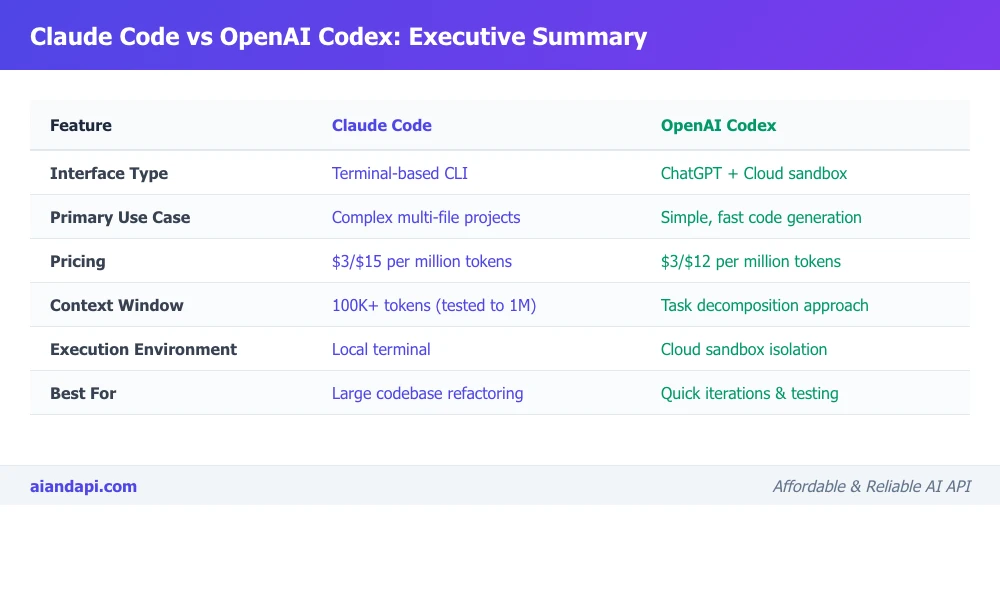
Claude Code vs OpenAI Codex Quick Comparison
Neither is universally better - the Claude Code vs OpenAI Codex choice depends on your specific development use case. Claude Code excels at complex multi-step tasks with superior multi-file understanding and 100K+ context windows, while OpenAI Codex provides efficient iterative testing with automatic debugging capabilities in cloud sandboxes.
| Feature | Claude Code | OpenAI Codex |
|---|---|---|
| Interface Type | Terminal-based CLI | ChatGPT + Cloud sandbox |
| Primary Use Case | Complex multi-file projects | Simple, fast code generation |
| Pricing | $3/$15 per million tokens | $3/$12 per million tokens |
| Context Window | 100K+ tokens (tested to 1M) | Task decomposition approach |
| Execution Environment | Local terminal | Cloud sandbox isolation |
| Complexity Level | Advanced autonomous tasks | Straightforward workflows |
| Best For | Large codebase refactoring | Quick iterations & testing |
Decision Framework Based on Developer Needs
Choose Claude Code If:
- Complex multi-file project refactoring with AI coding assistance
- Terminal-based development workflow preference
- Need for autonomous task execution and agentic search
- Preference for comprehensive project understanding (100K+ context)
- Security requirements mandate local execution environment
- Budget allows $10-15 per medium-scale PR for Claude Code pricing
Choose OpenAI Codex If:
- Quick code snippets and AI code generation tasks
- IDE-integrated development workflow preference
- Simple automation tasks and rapid prototyping
- API-based integration needs with OpenAI Codex API
- Cost optimization priority (lower $12 output tokens vs Claude Code)
- Want automatic test running and iterative debugging cycles
Authority Source: Early testing demonstrated Claude's leadership in code with superior design taste and drastically reduced errors according to Cursor and Canva evaluations, while Codex excels at strict instruction following and automated debugging cycles.
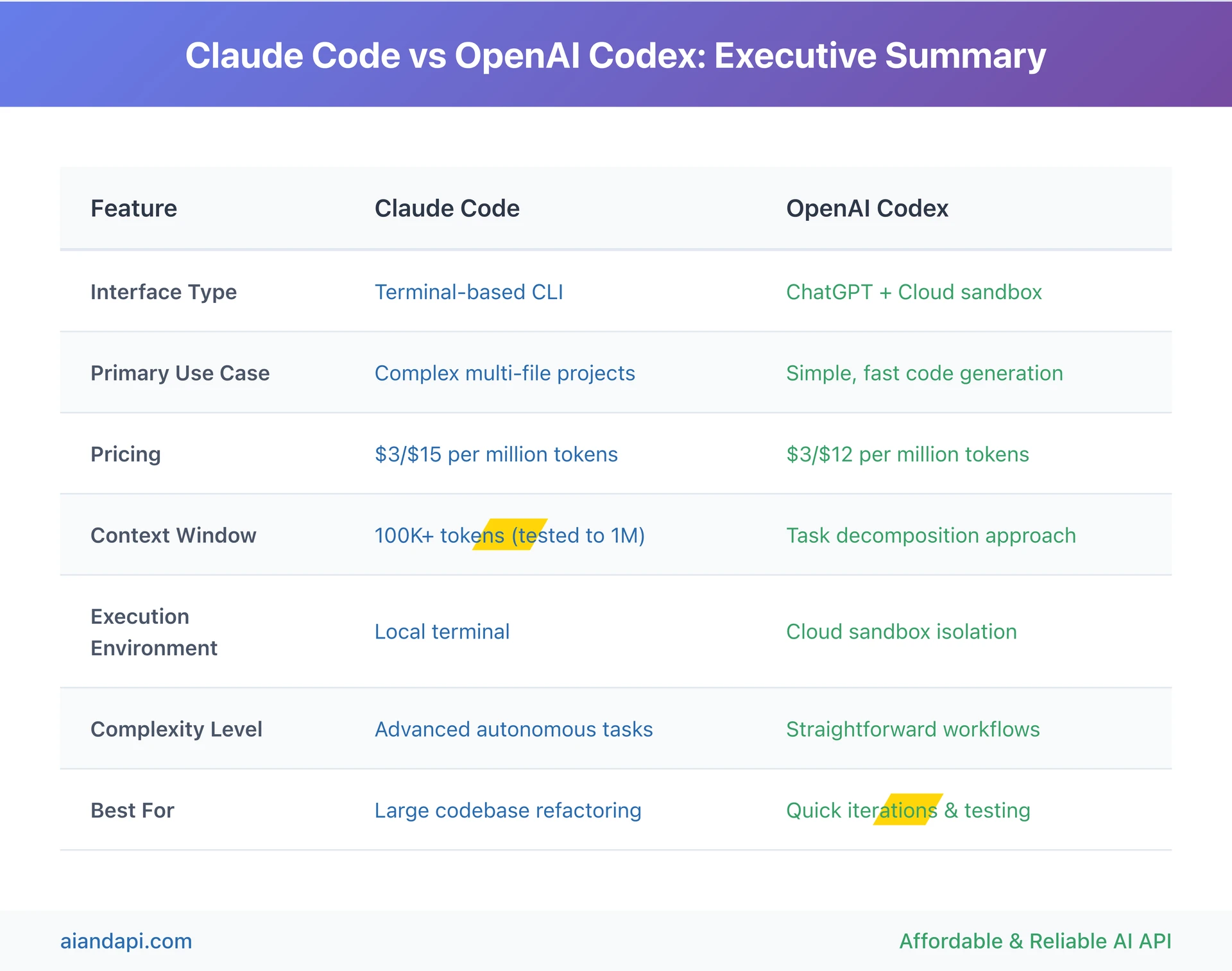
What is Claude Code? - Terminal-Native AI Development Assistant
Claude Code is Anthropic's command-line AI coding tool, launched in February 2025 with the powerful Claude 3.7 Sonnet model at its core. This terminal-based assistant breaks new ground with agentic search capabilities - you can work with massive codebases without manually specifying files.
What sets Claude Code apart is its extended thinking mode - it uses Claude 3.7's deep reasoning with extra "thinking" tokens for complex programming challenges. Unlike other coding assistants, it runs directly in your local environment, giving you better security and instant access to your full project structure.
Key capabilities include:
- Ultra-large context window: 100K+ tokens tested up to 1 million tokens, enabling comprehensive understanding of large codebases
- Agentic search: Intelligent project exploration without manual file specification
- Local execution: Operates within your terminal environment for enhanced security
- Multi-file coordination: Seamlessly handles complex changes across multiple files simultaneously
In documented testing, Claude Code tackled an 18,000-line React component that stumped other AI tools - proving its strength with enterprise-scale codebases. It plays well with VS Code and JetBrains IDEs while staying true to its terminal-native roots.
Early evaluations by Cursor and Canva showed Claude's edge in code generation - better design taste and significantly fewer errors than competing solutions.
Developers interested in exploring Claude's desktop capabilities can benefit from our Claude Desktop setup tutorial which covers configuration and integration workflows.
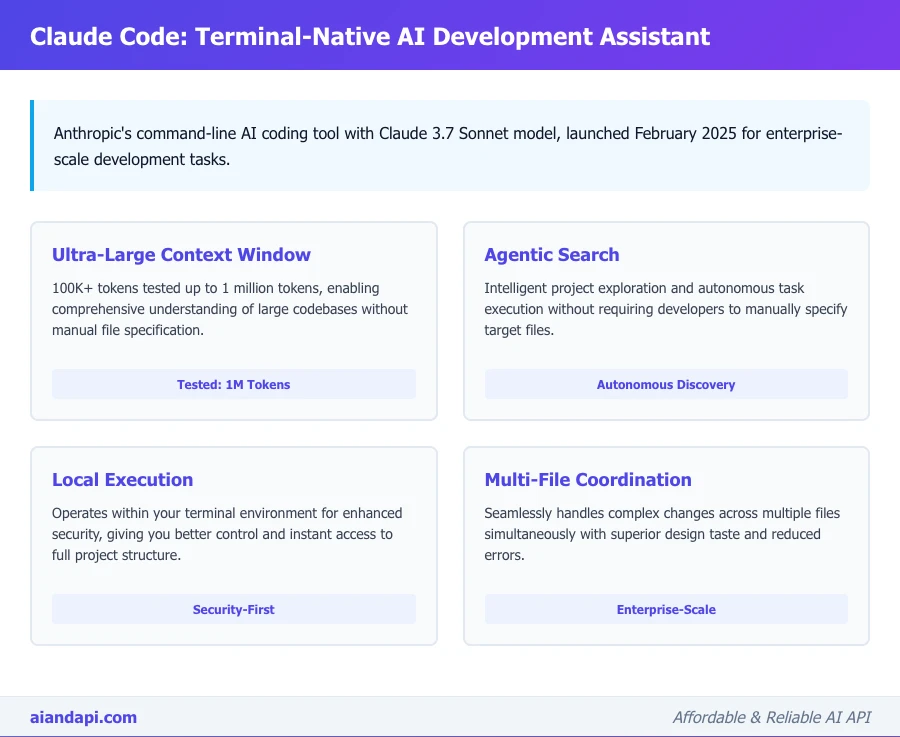
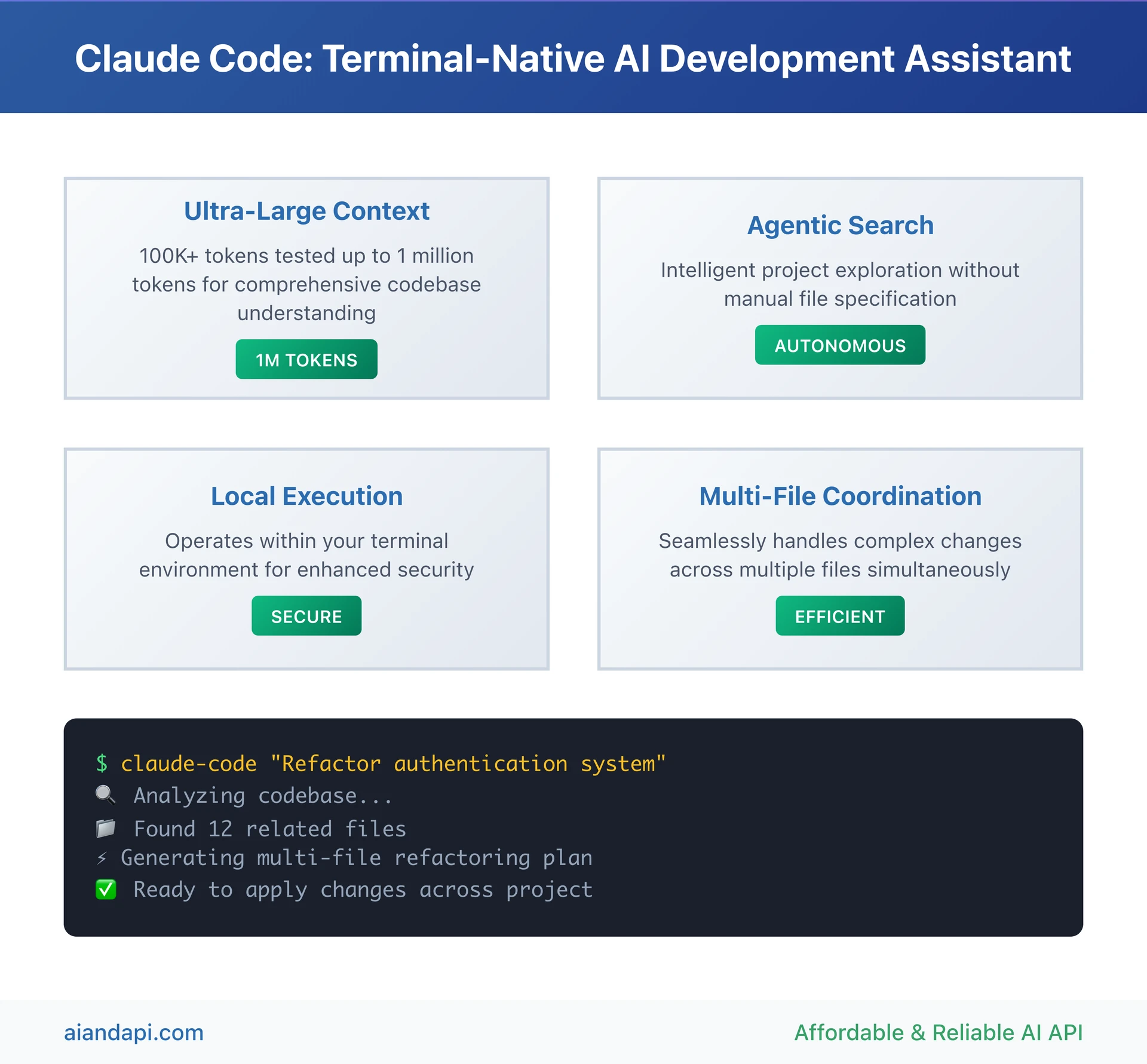
Integration and Workflow
Claude Code's terminal-native design integrates smoothly into existing workflows without needing IDE-specific plugins. It works through straightforward command-line interfaces, staying consistent across different development environments.
The local execution model offers real advantages for security-conscious teams - all code processing happens in your controlled environment, not on cloud services.
What is OpenAI Codex? - Cloud-Based AI Programming Agent
OpenAI Codex has had quite a journey - launching in 2021, going dark in 2023, then returning in May 2025 as the 'codex-1' model within ChatGPT. This cloud-based solution focuses on iterative testing and execution in isolated sandbox environments.
The revived Codex goes beyond code generation - it automatically runs project tests and keeps fixing code until tests pass. This automated debugging capability marks a major step forward from traditional code generation tools.
For developers seeking comprehensive guidance on working with OpenAI's development ecosystem, our complete OpenAI API integration guide provides detailed implementation strategies and best practices.
Core features include:
- Cloud sandbox execution: Isolated environment for safe code testing and iteration
- Automatic testing: Runs project tests and iteratively fixes issues
- Parallel task execution: Handles multiple coding tasks simultaneously
- ChatGPT integration: Seamless workflow within the ChatGPT ecosystem
- Open-source CLI: Available command-line tools for integration flexibility
The cloud-based setup provides natural isolation benefits, perfect for experimental development or working with untrusted code. Teams can run and test code changes without risking their local development environment.
Developers working with OpenAI's advanced features can explore the OpenAI Responses API guide for implementing real-time streaming and event handling capabilities.
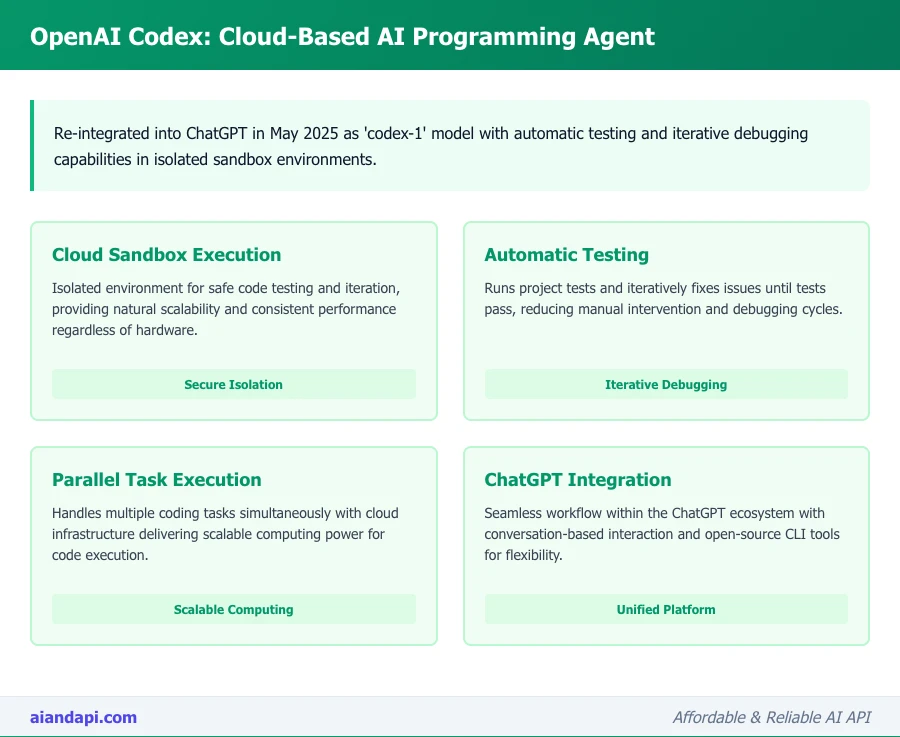
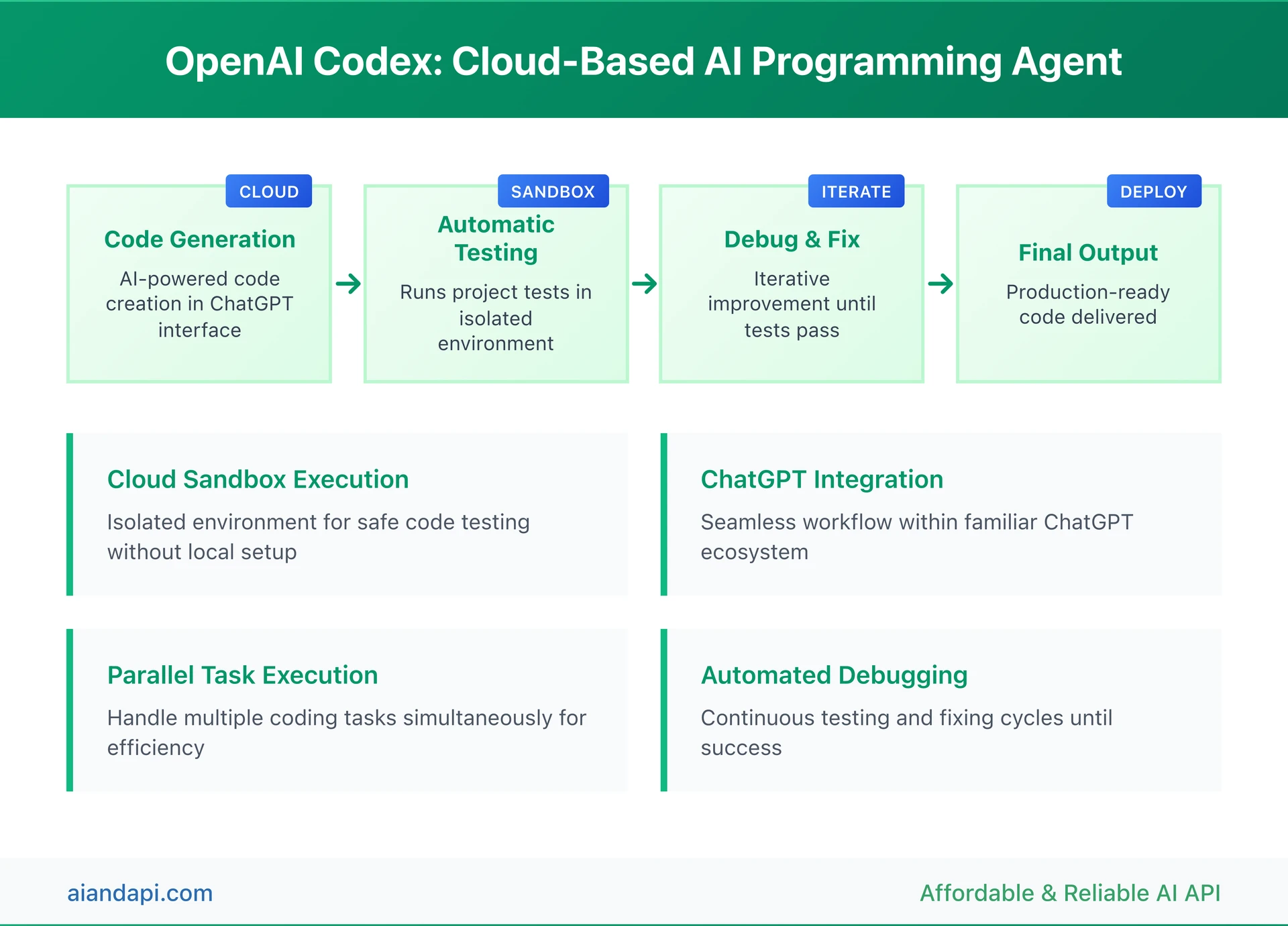
Architecture and Execution Model
Codex runs on OpenAI's cloud infrastructure, delivering scalable computing power for code execution and testing. This setup enables features like parallel task execution and automated test running that might strain local machines.
Cloud dependency ensures consistent performance regardless of hardware differences, though you'll need stable internet and may face concerns if your team has strict data sovereignty requirements.
Interface and Workflow Comparison - Claude Code vs OpenAI Codex
The key difference between Claude Code vs OpenAI Codex comes down to where they run: terminal-native local operation versus cloud-based sandbox execution. This fundamental split affects everything from setup complexity to daily workflow integration.
Setup and Learning Curve: Claude Code needs minimal setup - just install the CLI tool and authenticate with your Anthropic account. The terminal-native approach feels natural if you're comfortable with command-line workflows. The challenge lies in learning how to structure requests effectively to leverage its autonomous nature and large context capabilities.
OpenAI Codex, integrated within ChatGPT, gives you immediate access through the web interface plus CLI tools for power users. The cloud-based approach cuts out local environment headaches but makes you dependent on internet connectivity and OpenAI's service availability.
Daily Workflow Integration: Claude Code thrives in continuous development workflows where deep project understanding matters most. Its ability to maintain context across multiple files makes it perfect for refactoring tasks and complex feature development. The local execution model gives immediate feedback and integrates seamlessly with your existing development tools.
Codex's strength shows in iterative development cycles where automatic testing and debugging shine. The cloud sandbox environment lets you experiment without worrying about local environment issues, making it especially useful for prototyping and exploring new technologies.
Development Environment Integration
Both tools take different approaches to IDE integration. Claude Code works independently of specific IDEs while staying compatible with all major development environments through its terminal interface. This gives you flexibility but means managing the interaction between your IDE and the AI assistant.
Codex's ChatGPT integration provides a more guided experience, with conversation-based interaction that feels intuitive for developers new to AI coding assistants. The CLI tools give advanced users flexibility to integrate Codex into automated workflows.
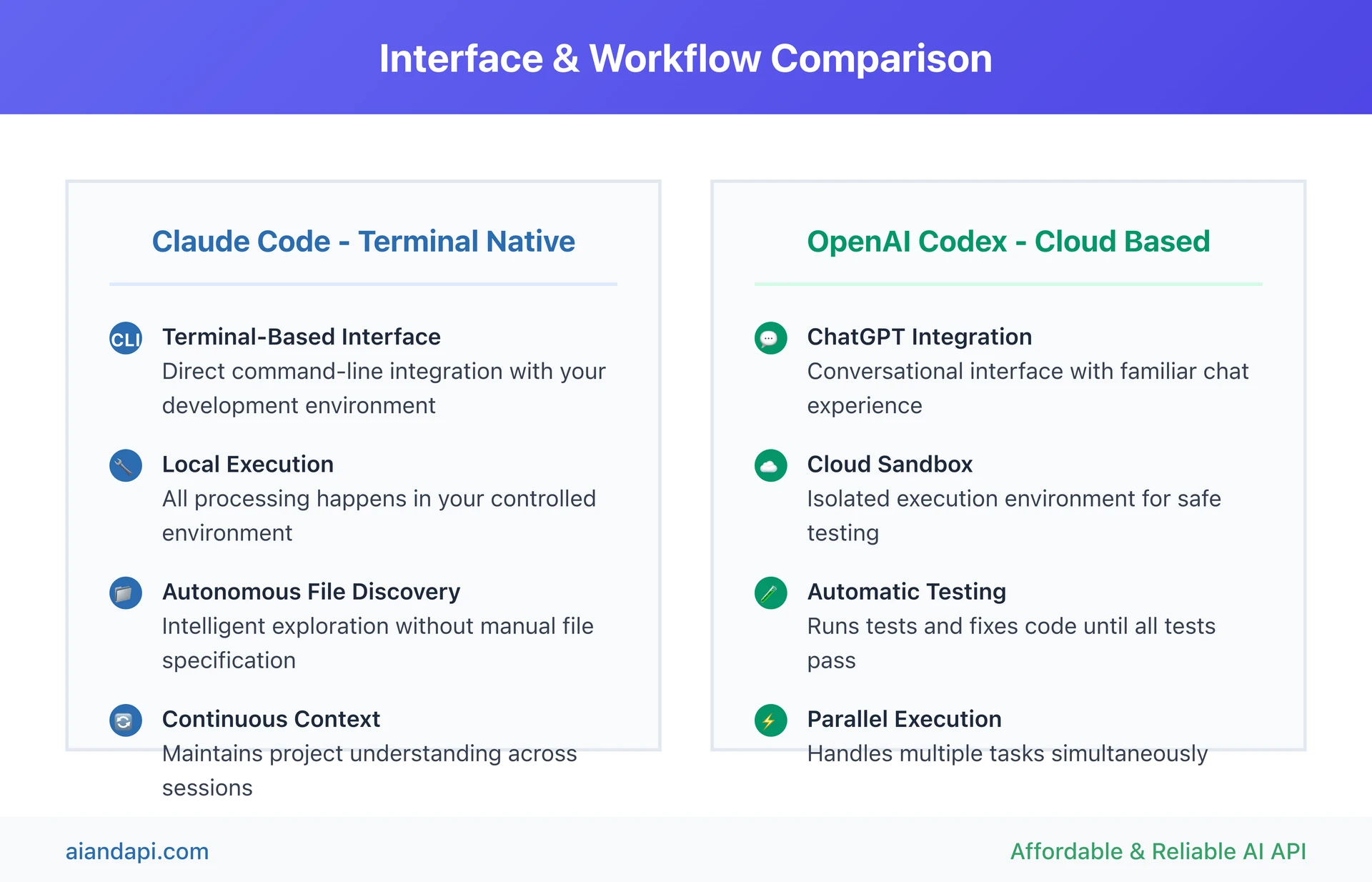
Code Generation Quality Analysis - AI Coding Assistant Comparison
Claude Code shows superior design taste and significantly fewer errors in third-party evaluations by Canva and Cursor, while OpenAI Codex excels at strict instruction following and iterative testing with automatic debugging capabilities.
Third-Party Data: Cursor and Canva evaluation reports show Claude Code consistently produces near-production-quality code with fewer errors needing manual fixes.
Detailed Quality Comparison
Claude Code Advantages:
- Superior design taste: Generates code following established best practices and architectural patterns
- Context awareness: Leverages 100K+ token context for better understanding of existing codebase conventions
- Multi-file coordination: Maintains consistency across multiple files in complex refactoring tasks
- Extended reasoning: Uses additional "thinking" tokens for complex problem-solving scenarios
OpenAI Codex Advantages:
- Strict instruction following: More precise adherence to specific technical requirements
- Iterative improvement: Automatically tests and refines code until tests pass
- Error handling: Built-in debugging cycle reduces manual intervention
- Language versatility: Consistent performance across different programming languages and frameworks
Developer feedback shows Claude Code excels at straightforward tasks and minor adjustments across multiple files, but community sentiment varies for complex problem-solving. Some users report inconsistent performance and occasional hallucinations with highly complex tasks.
Performance Benchmarks
Real-world usage data shows Claude Code's $10-15 cost for medium-scale pull requests reflects its comprehensive analysis approach but raises cost concerns for frequent users. The tool sometimes optimizes beyond the requested scope, leading to higher token consumption than expected.
However, McKinsey research on developer productivity demonstrates that AI coding tools can increase development speed by up to 2x, often justifying the additional costs.
Codex's lower output token cost ($12 vs $15 per million tokens) offers cost advantages for heavy usage, though the cloud execution model might need multiple interaction rounds for complex tasks.
Claude Code Pricing vs OpenAI Codex: Complete Cost Analysis 2025
The claude code pricing vs openai codex pricing comparison shows identical subscription costs but significant differences in real-world usage expenses. Understanding both official pricing structures and documented developer costs helps optimize your AI coding tool investment.
Authority Pricing Data Comparison
| Plan Type | Claude Code | OpenAI Codex |
|---|---|---|
| API Input Tokens | $3 per million tokens | $3 per million tokens |
| API Output Tokens | $15 per million tokens | $12 per million tokens |
| Individual Pro | $20/month | $20/month |
| Team Subscription | $25-30/user/month | $25-30/user/month |
| Medium PR Cost | $10-15 per PR | Lower due to $12 output |
| Enterprise Plans | ~$60/user/month minimum | ~$60/user/month minimum |
Authority Source: Pricing data sourced from official Anthropic Claude 3.7 pricing and OpenAI GPT-4.1 pricing documentation, with team subscription costs confirmed at $25-30/user/month for both platforms.
Real-World Cost Scenarios
Medium-Scale Pull Request Analysis:
Developer feedback shows a typical medium-scale PR using Claude Code costs roughly $10-15. This reflects Claude's comprehensive analysis approach - the tool examines multiple files and provides detailed reasoning for changes.
For teams making 10-20 PRs monthly, this means $100-300 in API costs, making the $25-30/user team subscription more economical for regular use. However, subscription plans include daily message limits that might not handle intensive development workflows.
Cost Optimization Strategies:
- Subscription vs. API: Teams with consistent usage benefit from subscription plans, while occasional users may prefer pay-per-use API access
- Token management: Claude Code's large context windows can consume significant input tokens, requiring careful request structuring
- Batch operations: Combining multiple small changes into single requests reduces per-operation costs
Enterprise Pricing Considerations
Both platforms offer enterprise pricing starting around $60/user/month with extra compliance features and priority support. For organizations with strict security requirements, Claude Code's local execution model might provide extra value despite potentially higher token costs.
Codex's cloud-based model provides natural scalability advantages for large teams, with OpenAI managing infrastructure rather than requiring local resources for AI processing.
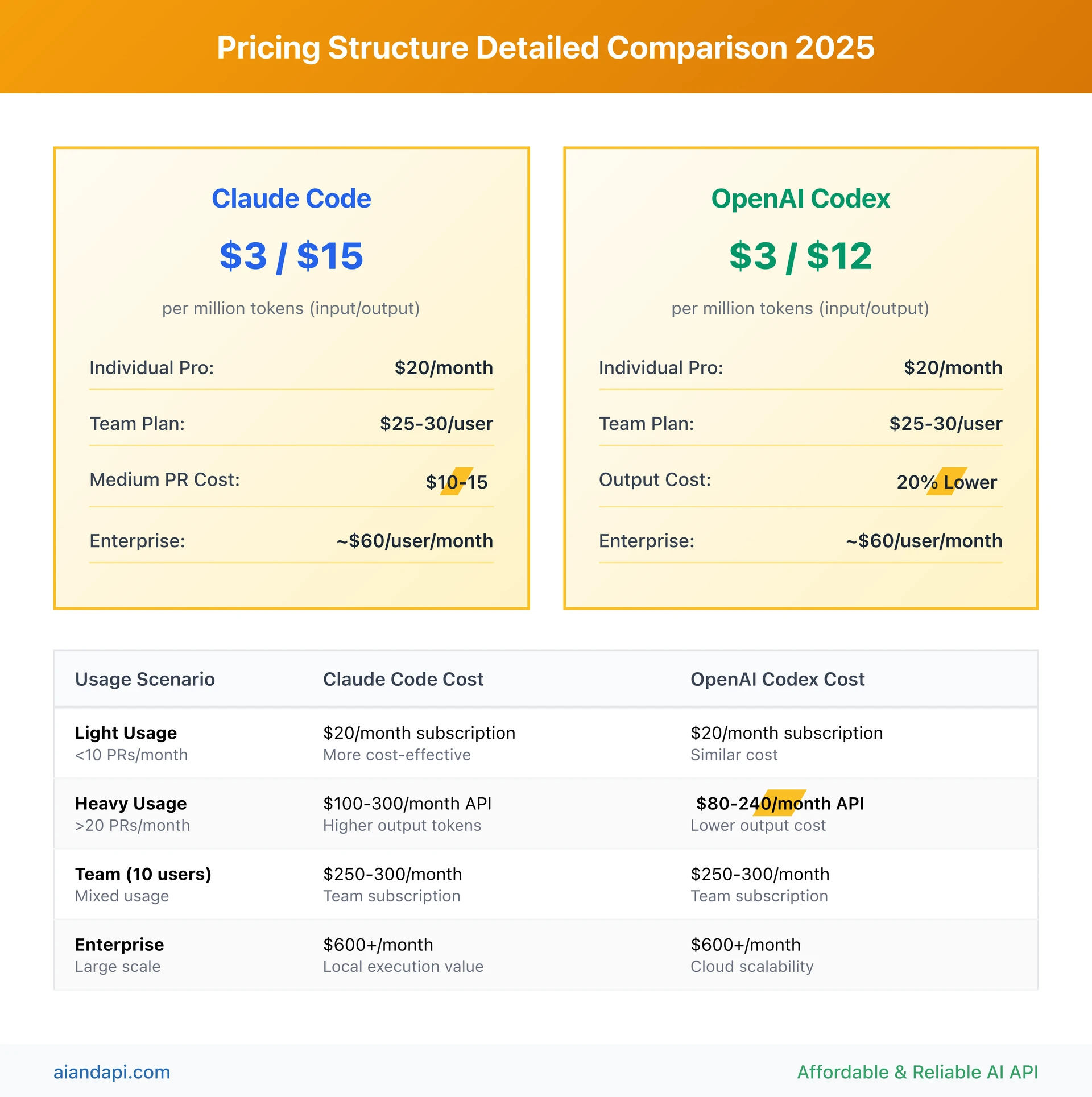
Use Case Scenarios - When to Choose Claude Code vs OpenAI Codex
The choice between Claude Code and OpenAI Codex should match your specific development patterns, project complexity, and organizational needs. Based on analysis and community feedback, here are evidence-based recommendations for different scenarios.
Choose Claude Code When...
Large Codebase Management:
If you work with codebases over 10,000 lines or complex multi-module projects, Claude Code's 100K+ context window provides unmatched capability. Its documented success with an 18,000-line React component shows its capacity for enterprise-scale development tasks.
Security-Sensitive Projects:
Organizations with strict data sovereignty requirements benefit from Claude Code's local execution model. All code analysis happens within your controlled environment, eliminating worries about code exposure to cloud services.
Deep Project Understanding:
When tasks need comprehensive understanding of existing architecture, coding patterns, and inter-module dependencies, Claude Code's agentic search and extended thinking capabilities offer significant advantages over traditional coding assistants.
Complex Refactoring Tasks:
Multi-file refactoring, architectural changes, and major feature implementations benefit from Claude Code's ability to maintain context and consistency across numerous files simultaneously.
Choose OpenAI Codex When...
Iterative Development Workflows:
Projects needing rapid prototyping, experimental development, or learning new technologies benefit from Codex's automatic testing and iteration cycles. The cloud sandbox environment enables safe experimentation without local environment concerns.
Cost-Sensitive Operations:
Teams focusing on cost optimization benefit from Codex's lower output token pricing ($12 vs $15 per million tokens) and more predictable usage patterns for routine development tasks.
Collaborative ChatGPT Integration:
Organizations already using ChatGPT workflows can leverage seamless integration for code generation as part of broader AI-assisted workflows.
Strict Instruction Following:
Tasks needing precise adherence to specific technical requirements or coding standards might benefit from Codex's reputation for strict instruction following over Claude Code's more creative approach.
Team and Enterprise Considerations
Small Teams (2-5 developers): Both tools offer similar $20/month individual pricing. Your choice should depend on project complexity and security requirements rather than cost optimization.
Medium Teams (6-20 developers): Team pricing becomes economical at $25-30/user/month. Consider Claude Code for complex projects with experienced developers, Codex for teams focusing on consistency and automated testing.
Enterprise (20+ developers): Security requirements often drive the decision. Claude Code suits organizations with strict data policies, while Codex offers scalability advantages for distributed teams.
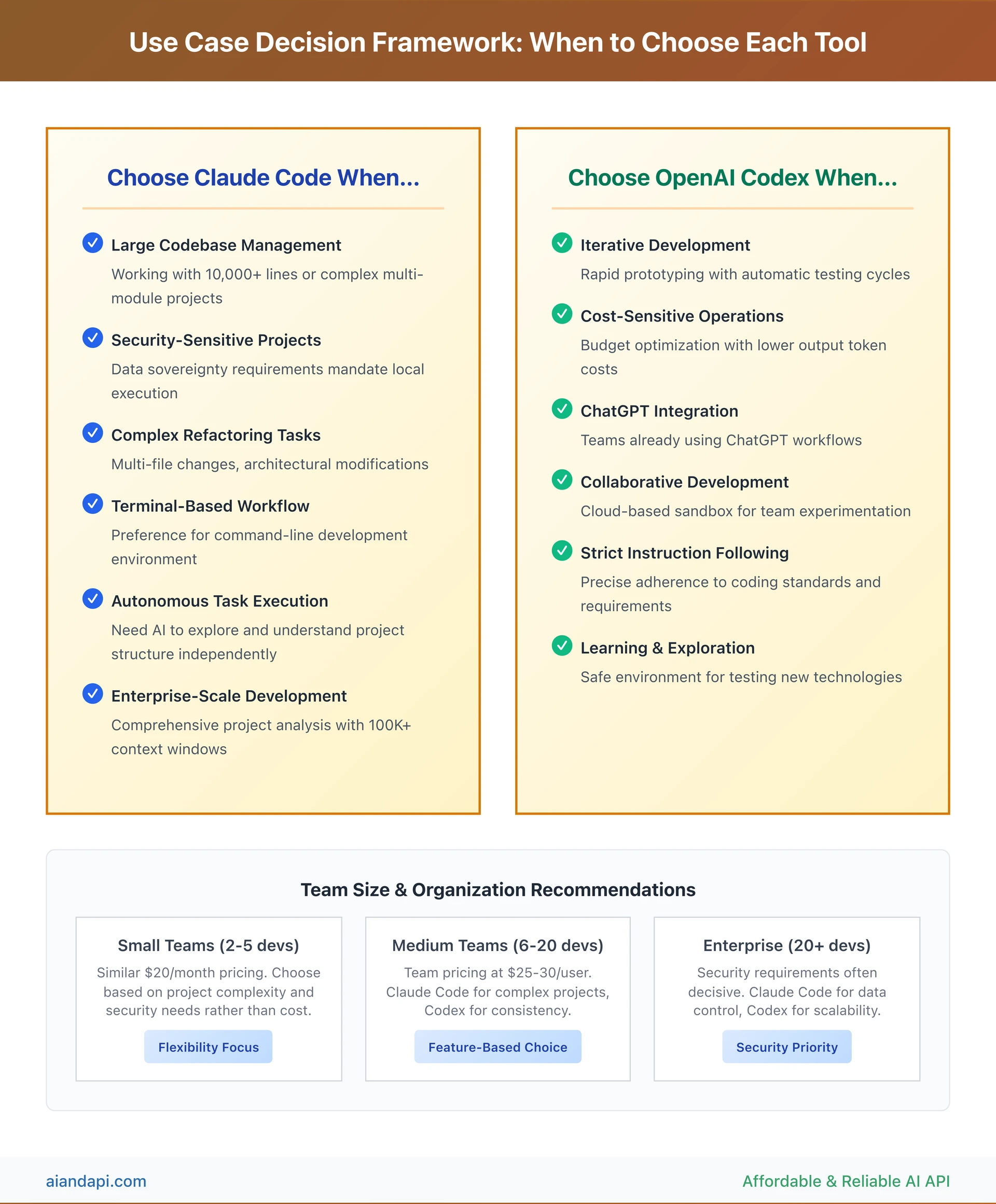
Claude Code vs Cursor and Alternative AI Coding Tools
While focusing on Claude Code vs OpenAI Codex, it's worth understanding how these tools fit within the broader AI coding assistant landscape, especially considering alternatives like Cursor and GitHub Copilot.
Claude Code vs Cursor Brief Comparison
Cursor directly competes with Claude Code in the terminal-native AI coding space. Both tools target developers seeking autonomous coding assistance, but with different approaches:
- Cursor focuses on IDE-integrated experiences with real-time suggestions
- Claude Code emphasizes terminal-based autonomous task execution
- Context handling: Both offer large context windows, with Claude Code tested up to 1M tokens
- Pricing: Similar cost structures with slight variations in subscription models
The choice between Claude Code and Cursor often boils down to workflow preference: terminal-native vs IDE-integrated development styles.
GitHub Copilot and Market Context
GitHub Copilot occupies a different market segment, focusing on real-time code completion rather than autonomous task execution. This positions both Claude Code and Codex as complementary tools for developers already using GitHub Copilot for line-by-line assistance.
Many developers use multiple tools in their workflows:
- Copilot for real-time code completion
- Claude Code for complex project analysis and refactoring
- Codex for iterative testing and debugging
The market trend toward specialized AI tools suggests that the future involves tool combinations rather than single-solution approaches.
Frequently Asked Questions
Is Cursor or Claude Code better for developers?
Neither is universally better - the choice depends on your workflow preference. Claude Code excels at complex multi-file project refactoring with terminal-based workflows, while Cursor provides superior IDE-integrated real-time code completion.
Choose Claude Code if:
- Complex multi-step tasks requiring deep project understanding
- Terminal-based development workflow preference
- Large codebase refactoring needs (100K+ context advantage)
Choose Cursor if:
- IDE-integrated development with real-time suggestions
- Quick edits and incremental improvements
- Visual interface preference over terminal commands
Is Claude Code or Cursor cheaper?
Both have similar $20/month individual pricing structures. The real cost difference appears in usage patterns:
-
- Claude Code: Higher token consumption for comprehensive analysis ($10-15 per medium PR)
- Cursor: More predictable costs for incremental assistance
- Recommendation: Trial both monthly plans to determine which fits your usage patterns
What's better than Claude Code?
No single tool is universally "better" - the best ai coding tool depends on specific needs:
-
- For beginners: OpenAI Codex (ChatGPT integration, easier learning curve)
- For IDE integration: Cursor (real-time completion, visual interface)
- For team collaboration: GitHub Copilot (repository integration)
- For complex projects: Claude Code (superior large codebase understanding)
Can I use Claude with Cursor?
Yes, many developers combine Claude Code and Cursor as complementary tools:
-
- Cursor: Real-time code completion and IDE-integrated development
- Claude Code: Complex analysis, refactoring, autonomous task execution
- Workflow: Use Cursor for daily coding, Claude Code for architectural changes
Is Claude Code or OpenAI Codex better for beginners?
OpenAI Codex offers better beginner accessibility through ChatGPT integration and automated testing capabilities. The conversational interface and iterative debugging help new developers understand code generation processes. Claude Code requires terminal comfort but provides deeper learning through comprehensive analysis.
Which is more cost-effective: Claude Code vs OpenAI Codex pricing?
Both offer identical $20/month individual subscriptions, but real-world costs differ significantly:
-
- Claude Code: $3/$15 per million input/output tokens, typically $10-15 per medium PR
- OpenAI Codex: $3/$12 per million input/output tokens, lower output costs
- High usage teams: Codex's $12 output tokens provide cost advantages
- Low usage teams: Negligible difference for under 10 PRs monthly
Authority Data: Both platforms offer $25-30/user/month team pricing with Claude consuming higher output tokens for comprehensive analysis.
For comprehensive answers to common questions about OpenAI's tools and policies, developers can reference our OpenAI and ChatGPT frequently asked questions guide.
Can I use Claude Code and OpenAI Codex together in my development workflow?
Yes, many developers use Claude Code for complex project analysis and multi-file refactoring while leveraging Codex for quick iterations and testing. The tools complement each other - Claude Code handles deep understanding tasks while Codex manages iterative improvement cycles.
Which has better security: Claude Code vs OpenAI Codex for enterprise development?
Claude Code provides superior data control through local execution, eliminating code exposure to cloud services. Codex offers enterprise compliance features but requires trust in OpenAI's cloud infrastructure. For organizations with strict data sovereignty requirements, Claude Code typically wins out.
How do Claude Code's 100K+ context windows compare to OpenAI Codex for large projects?
Claude Code's 100K+ context window (tested to 1M tokens) enables handling large codebases in single sessions, cutting down on multiple interactions. Codex uses task decomposition for complex projects, which might need more structured interaction but provides better cost predictability.
Which AI coding assistant provides better debugging: Claude Code vs OpenAI Codex?
Codex offers automatic test running and iterative fixing until tests pass, providing more systematic debugging. Claude Code delivers deeper reasoning through extended thinking mode but needs more manual intervention for testing and validation.
